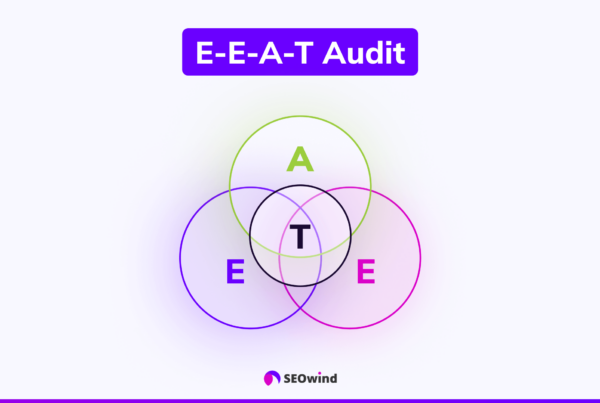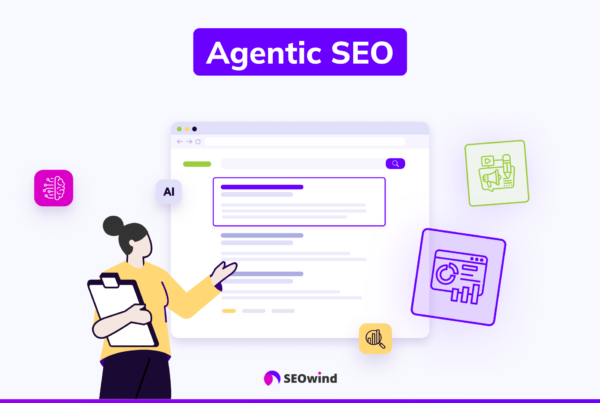The digital landscape is constantly shifting, and keeping up with Google’s algorithm updates can feel like navigating a maze. The March 2024 Core Update has sent ripples through the search engine optimization (SEO) community, leaving many website owners and content creators wondering about its impact.
Fortunately, I’m here to explain this update and equip you with the knowledge you need to thrive in organic searches.
Overview of the Google March 2024 Core Update
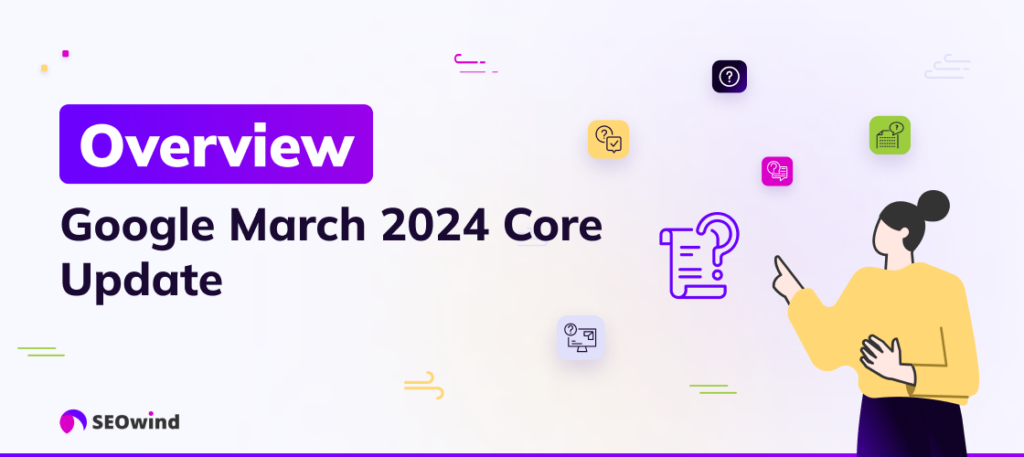
What is the Google March 2024 Core Update?
Every so often, Google rolls out significant updates to its core algorithm, the intricate system that determines how websites are ranked in search results. These updates are designed to improve the overall quality of search results by rewarding sites that offer valuable, relevant, and user-friendly experiences. The March 2024 Core Update is one such update and has brought several fundamental changes that impact how we approach SEO and content creation.
Significance of the March 2024 Update Compared to Previous Updates
This update stands out because it emphasizes content quality, user experience, and combatting spam. While previous updates have touched on these elements, the March 2024 update takes a more holistic approach by integrating aspects of earlier updates like the Helpful Content Update and introducing new measures to tackle emerging challenges, such as AI-generated content and spammy tactics.
Comprehensive Analysis: How Does This Affect Webmasters and Content Creators?
The March 2024 update has wide-ranging implications for anyone involved in the online world. Webmasters need to ensure their websites adhere to the latest quality and spam guidelines. Meanwhile, content creators must focus on producing high-quality, original content that benefits users. This update encourages a shift to a more user-centric SEO approach that emphasizes delivering value and a positive experience.
What do SEO gurus say about the March Core Update?
The March 2024 Core Update has generated considerable buzz within the SEO community. Let’s hear what some of the industry’s leading experts have to say about it.
Kevin Indig, Director of SEO at Shopify
AI is a Double-Edged Sword. Kevin highlights the transitional phase in SEO and content strategy due to AI advancements. The Google Core March Update reflects the company’s response to the challenge and opportunity presented by AI in content creation and search relevance.
AI’s dual role, improving the relevance of Google content and enabling creators to generate more content, changes the dynamics of content quality and quantity on the web.
Quality Over Quantity: One crucial element of the update emphasizes content quality. Kevin notes the shift from prioritizing sheer content volume to focusing on its value and relevance. This shift addresses the threat of low-quality, AI-generated content flooding Google’s index, pushing creators to produce genuinely helpful and high-quality content.
User Experience and Intent: The update places a stronger emphasis on understanding user intent and improving the overall user experience. Kevin discusses the importance of aligning content with what users are looking for, going beyond keyword matching to fulfill their actual needs and questions.
SEO Strategies Need Evolution: Kevin suggests that traditional SEO strategies must evolve to remain effective. The update has prompted experts to rethink keyword stuffing and over-optimization tactics. Instead, there’s a push towards more sophisticated SEO practices that create valuable content that genuinely addresses user queries and interests.
Impact on Content Strategy: The update influences companies to reassess their content strategies, especially regarding AI-generated content. Kevin points out the need to balance the use of AI for efficiency and ensuring the content remains authentic, valuable, and human-centric. The future of successful SEO and content strategy lies in leveraging AI intelligently without sacrificing the quality and relevance that users expect.
Mordy Oberstein, Head of SEO Branding at Wix
Integration of Helpful Content Update into Core Algorithm: Mordy argued that the March Core Update integrated the Helpful Content Update (HCU) into the core algorithm, marking a significant shift. This integration could either dilute the HCU’s impact or make its principles a dominant aspect of the core algorithm. He speculated that the latter is more likely, suggesting that the principles behind the HCU are now a driving force in how Google assesses and ranks content.
Focus on Quality and First-Hand Experience: The update aims to improve the quality of search results by prioritizing content that offers first-hand experience and expert knowledge. Google is responding to user demands for higher-quality content and is addressing the influx of low-quality, AI-generated content. This shift demonstrates the importance of producing informative content inspired by direct experience and deep expertise.
Domain-Level Quality Assessment: The update considers the quality of content at the domain level rather than individual pages. This means that the overall quality of a website’s content can impact its search rankings. Websites are encouraged to audit their content to ensure it meets Google’s quality standards across all pages rather than just high-traffic metrics.
Increased Sensitivity to User Behavior: Mordy suggested that Google is becoming more sensitive to how users interact with content and assesses content quality based on this metric. Therefore, SEO strategies should prioritize the user experience, ensuring that content not only ranks well but also satisfies user intent and keeps visitors engaged.
Emphasis on Branding and Identity: The discussion highlighted the growing importance of building a strong brand identity and digital presence. As Google becomes better at connecting users with content that aligns with their expectations, having a clear, recognizable brand that users seek out can be a significant advantage. This includes being present and active across multiple digital platforms, ensuring messaging consistency, and building a brand that people trust and recognize.
Tom Winter, CGO at SEOwind
Renowned SEO consultant Tom Winter hails the March 2024 update as a game-changer in the fight against spam and low-quality content. Here are his key takeaways:
Content Quality Reigns Supreme: Winter emphasizes the integration of the Helpful Content Update into the core algorithm. This marks a clear shift, prioritizing content that genuinely informs and aids users over content solely optimized for search engines. The focus is on creating content that solves user problems, not just chasing rankings.
Hybrid Approach with a Message: Winter observes that Google has taken a seemingly hybrid approach. While penalizing even well-established websites, it sends a strong message about content quality being a top priority. This is a way to instill caution and encourage all websites to prioritize user-centric content creation.
The User at the Forefront: Winter emphasizes that the update underscores Google’s commitment to the user experience. Websites that prioritize user satisfaction and provide genuine value will be rewarded in search rankings.
Detailed Breakdown of Major Changes Introduced in the March Core Update
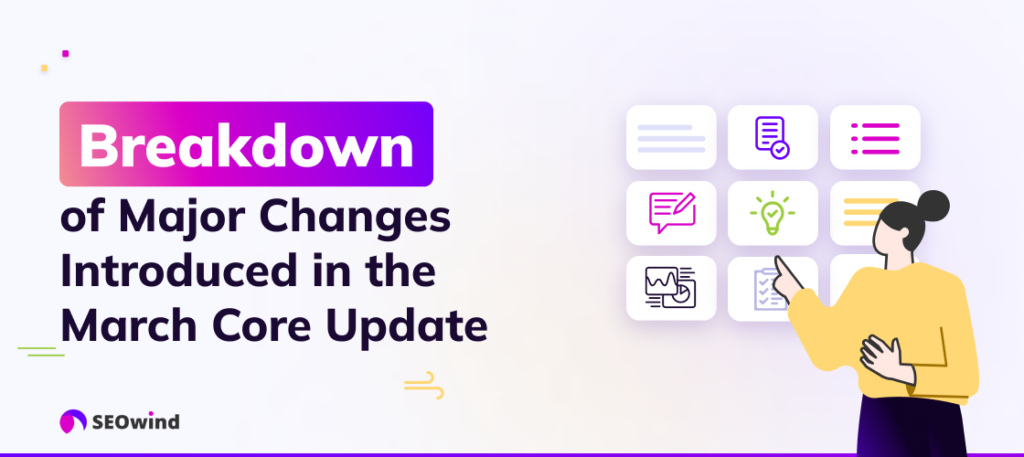
Google’s March 2024 core update wasn’t just another blip on the SEO radar. It brought significant changes that demand our attention. Let’s break down the key areas of focus in this update.
Incorporation of Helpful Content Guidelines into Core Algorithm
Remember the Helpful Content update from August 2022? It’s now deeply woven into the core algorithm. This means Google is getting serious about prioritizing content that genuinely helps users. The Helpful Content update was separate, but now it’s part of the main algorithm. So, creating content for people, not just search engines, is more critical than ever.
New Measures for Fighting Spam
Google has ramped up its efforts to combat spammy content. The March 2024 update specifically targets manipulative tactics that try to game the system. This includes strategies like keyword stuffing, cloaking, and sneaky redirects. It’s all about ensuring users find authentic and trustworthy information.
Targeting AI-Generated Content: What You Need to Know
With the rise of AI writing tools, Google is also focusing on identifying and addressing AI-generated content that lacks value or originality. While AI can be a helpful tool, it’s important to use it responsibly and ensure that the content you publish is still high quality and provides value to your audience. Google wants human-created content that reflects expertise and experience, not just machine-generated text.
Fighting Spam: Closer Look
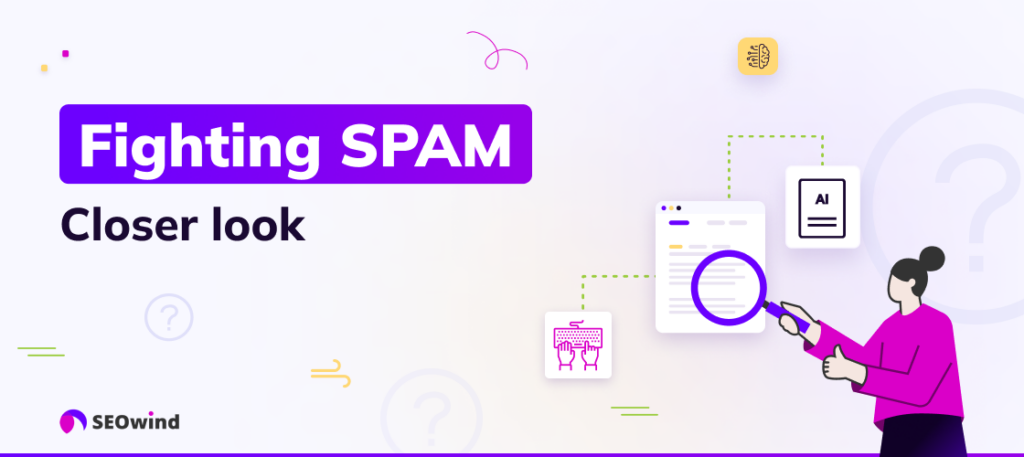
Let’s explore the main areas targeted by the March 2024 Core Update.
Scaled Content Abuse
Picture this: you stumble on a website with tons of content, but it’s generic, repetitive, and seems to be everywhere. That’s called scaled content abuse, meaning the mass production of low-quality content across numerous sites to manipulate search rankings. The March update tackles this issue head-on to ensure that genuine, valuable content gets the recognition it deserves.
Site Reputation Abuse
Some websites try to game the system by artificially inflating their reputation with fake reviews or manipulated backlinks. Google’s March update includes measures to identify and penalize such sites, safeguard the integrity of search results, and ensure users find trustworthy sources.
Expired Domain Abuse
Imagine a website with a previously sound reputation suddenly changing hands and being flooded with spammy content. That’s expired domain abuse, a tactic some use to exploit a domain’s existing authority. Google’s update aims to detect and address this issue, protecting users from encountering misleading content on seemingly reputable domains.
Identifying Affected Parties: Who Are the Losers?
The March 2024 core update shook the digital landscape, leaving many website owners bewildered as their sites vanished from Google’s search results. The impact was significant, with “hundreds of websites de-indexed,” according to Search Engine Journal. Let’s explore who felt the sting of the March 2024 core update.
Businesses Relying on Expired Domain Abuse
Expired domain abuse involves purchasing expired domains with established authority and backlinks to boost a website’s ranking quickly. The March 2024 update specifically targets this practice, penalizing sites that rely on this strategy rather than building organic authority. So, those who invested heavily in expired domains likely saw their rankings plummet.
Websites Involved in Scaled Content Abuse
Scaled content abuse often manifests as automatically generated content or content farms that churn out large volumes of low-quality articles with little to no value for users. These websites prioritize quantity over quality and often engage in keyword stuffing or other black-hat SEO tactics. The March 2024 update’s emphasis on helpful content and the user experience significantly impacted these sites, causing them to lose visibility in search results.
Websites Hosting Third-Party, Low-Value Content
Websites that host low-quality, third-party content, such as guest posts or sponsored articles, also face consequences. The update emphasizes the importance of original, authoritative content, making it crucial for websites to review any external content they publish carefully. Websites with a history of hosting spammy or irrelevant third-party content likely experienced ranking drops.
The Impact on SEO Strategies and Website Rankings
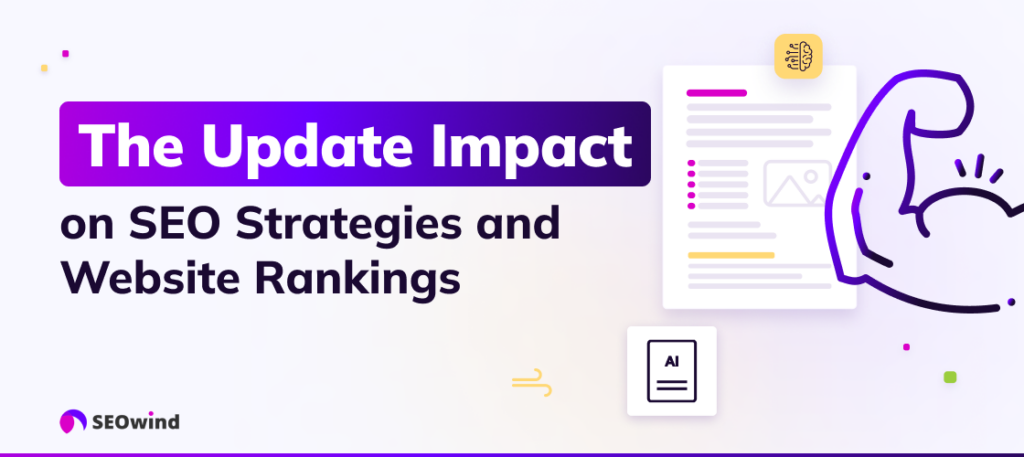
The March 2024 core update from Google has prompted website owners and SEO professionals to re-evaluate their strategies. While the dust is still settling, we’re beginning to see the immediate effects of this update on Search Engine Results Pages (SERPs) and website traffic.
As with any Google update, the March 2024 core update has caused fluctuations in website rankings. Some sites have experienced significant drops in their SERP positions, while others have seen improvements. The degree of impact varies widely depending on several factors, including the quality of the site’s content, its backlink profile, and its overall adherence to Google’s webmaster guidelines.
It’s important to remember that Google’s core updates aim to improve the overall quality of search results. This means that websites offering valuable, relevant, and well-structured content will likely benefit in the long run. Conversely, sites with thin content, spammy backlinks, or technical issues may see their rankings decline.
The March 2024 core update serves as a wake-up call for website owners and SEO professionals to prioritize quality, relevance, and user experience. By adapting to these changes and building sustainable SEO strategies, websites can navigate the evolving search landscape and achieve long-term success.
Best Practices for Adapting to the March Core Update 2024
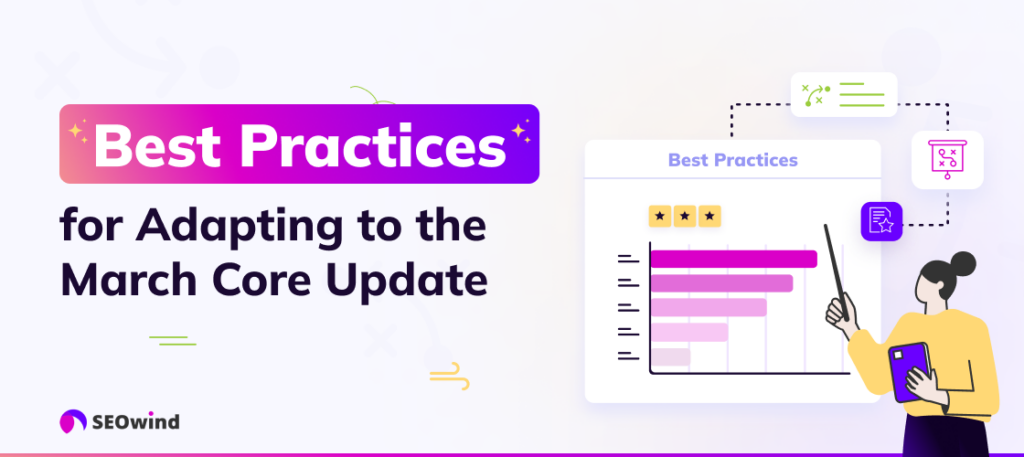
The March 2024 core update from Google has certainly shaken things up in the SEO world. But adapting and thriving in this new landscape is absolutely possible. Let’s explore some best practices to not only weather the storm but emerge stronger than before.
1. Enhancing Content Quality and Originality
The core of this update, and really any Google algorithm update, is a focus on quality content. It’s time to ditch those thin, keyword-stuffed articles and embrace content that provides your audience with value. Here’s what you can do:
- Focus on Experience, Expertise, Authoritativeness, and Trustworthiness (E-E-A-T): Demonstrate your knowledge and build trust by creating well-researched content backed by credible sources and data.
- Understand Search Intent: Go beyond keywords and understand the reason behind a search. What are users looking for when they type in a query? Tailor your content to fulfill their needs and answer their questions comprehensively.
- Prioritize Originality: Avoid rehashing existing content. Offer your unique perspective and insights, and stand out with fresh, engaging content.
2. Steering Clear of 1-Click AI Content Generators
While AI writing tools can be valuable assets, relying solely on 1-click content generators is a recipe for disaster. The March 2024 update specifically targeted AI-generated content that lacks originality and depth. These tools often produce generic, repetitive content that fails to meet Google’s quality standards.
Instead of quick fixes, think of AI writing tools as assistants in your content creation process. Use them to overcome writer’s block, generate ideas, or even help with research. However, always inject your own expertise, insights, and unique voice into the content.
3. Navigating New Spam Policies: Prevention and Compliance Guidelines
Google’s crackdown on spam means staying compliant is more important than ever. Let’s look at some key steps:
- Steer Clear of Black Hat SEO: Avoid manipulative tactics like keyword stuffing, cloaking, and link schemes. These practices can lead to severe penalties, including de-indexing.
- Regularly Audit Your Website: Keep a close eye on your website for any spammy elements or outdated SEO practices that may have slipped through the cracks.
- Stay Informed: Stay updated on Google’s evolving spam policies and webmaster guidelines. This proactive approach helps you remain compliant and avoid potential hazards.
4. Strategic Approaches for Dealing with AI Content
While AI content generation tools can be helpful, it’s crucial to use them strategically and ethically. Here are some tips:
- Human Oversight is Key: Never rely solely on AI-generated content. Always have a human editor review and refine the content to ensure accuracy, originality, and alignment with your brand voice.
- Use AI as a Tool, Not a Crutch: Leverage AI to assist with research, generate ideas, or even create drafts. However, the final product should reflect your unique expertise and perspective.
- Focus on Value Addition: Use AI to enhance efficiency and free up your time to focus on higher-level tasks such as strategy, content optimization, and audience engagement.

5. Use the CyborgMethod™ when creating content
The CyborgMethod™ is gaining traction as a powerful approach to content creation. It involves combining the strengths of AI and human expertise. Here’s how to implement it effectively:
- AI-Powered Research and Drafting: Use AI tools to gather information, identify relevant keywords, and generate initial drafts.
- Human Refinement and Optimization: Elevate AI-generated content with your human touch. Add your unique insights, ensure factual accuracy, and optimize for search intent and readability.
- Strategic Content Promotion: Use your understanding of user interests and the current SEO landscape to promote your content effectively across various channels.
6. Technical SEO: Fine-Tuning the Engine
Technical SEO remains a crucial aspect of website optimization. Ensure your website is crawlable and indexable by building a logical site structure that includes user-friendly navigation. Regularly monitor for broken links, 404 errors, and other technical issues that can hinder your website’s performance.
Additionally, consider implementing structured data to provide search engines with more context about your content. This can enhance your search visibility and improve click-through rates.
CyborgMethod™ – the best answer to Google Core Update March 2024
The March 2024 core update shook the SEO world, leaving many wondering about the future of AI in content creation. While Google’s crackdown on spammy AI content is evident, it doesn’t mean automation’s role in SEO is over. It’s just evolving. This is where the CyborgMethod™ comes in. This approach provides a process by which human expertise and AI efficiency blend harmoniously to create high-quality, SEO-friendly content.
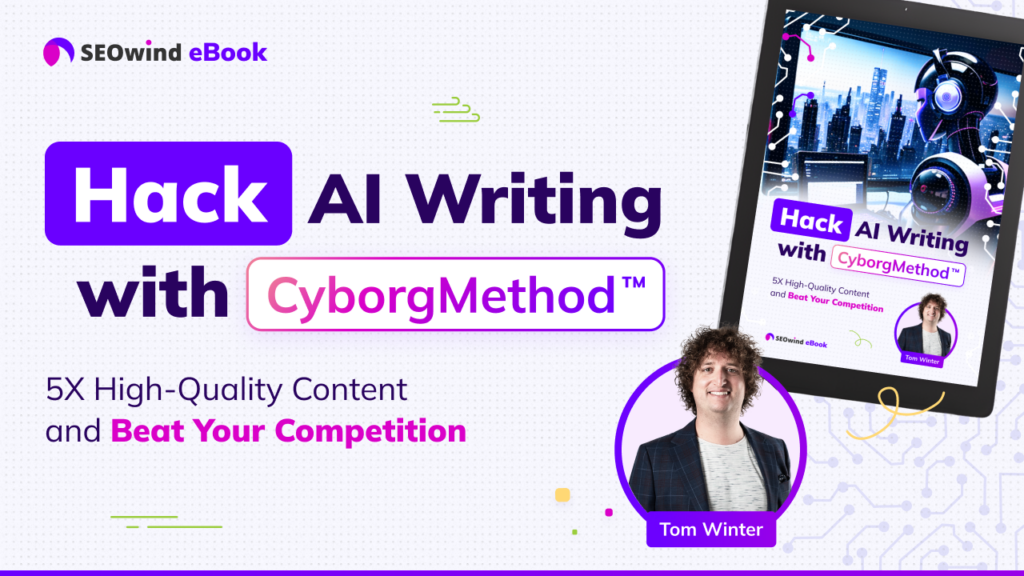
Treat AI as your partner to speed up content creation
Think of AI as your trusty sidekick, not a replacement. It’s there to assist you, not steal the show. The CyborgMethod™ emphasizes this partnership, allowing you to leverage AI’s speed and efficiency while maintaining your unique voice and expertise.
Stage 1: Create a Comprehensive Content Brief
Every great piece of content starts with thorough research. Really dig into your topic to understand your audience’s needs and identify relevant keywords. Tools like SEOwind can assist you in this process by providing valuable insights and data to inform your content strategy.
Stage 2: Create articles using AI
Once you’ve researched a topic, it’s time to apply automation. SEOwind’s AI writer uses your comprehensive brief to generate high-quality content that aligns with your SEO goals. But remember, an automated writer is only as good as the information it’s fed. This is where your expertise comes into play. By enriching the AI prompts with your knowledge and insights, you ensure the generated content is accurate, relevant, and engaging.
Stage 3: Give Your Content the Human Touch
AI-generated material is a solid foundation, but the human touch truly elevates it. Review the AI-generated draft and add your personal insights, anecdotes, and unique perspectives. Ensure the content flows naturally and resonates with your target audience.
Enjoy watching your traffic soar
By combining human creativity with AI efficiency, you’ll create content that Google loves and your audience craves. This leads to improved SEO rankings, increased organic traffic, and, ultimately, greater success for your online endeavors.
Sustainable strategies for using AI in content creation
Despite the crackdown, AI still has a valuable role in content creation when used ethically and strategically. Here’s how:
- AI as a research assistant: Use AI tools to gather data, analyze trends, and gain insights to inform your content strategy.
- AI for content outlines and briefs: Leverage AI to create comprehensive content outlines, ensuring your articles are well-structured and cover relevant subtopics.
- AI for content generation: Use AI as a writing assistant to generate drafts or sections of content, but always add your expertise and insights to ensure originality and value.
- AI for content optimization: Use AI tools to analyze your content for SEO best practices, identify areas for improvement, and enhance readability.
- AI for content translation: Expand your reach by using AI to translate your content into multiple languages, ensuring cultural relevance and accuracy.
The Future of SEO Post-March Core Update
The March 2024 Core Update signifies Google’s unwavering commitment to delivering high-quality search results to its users. It underscores the importance of prioritizing genuine value and relevance in content creation and SEO strategies. Let’s explore what this means for the future of SEO and how we can ensure long-term success.
Predictions on Further Integration of Quality and Relevance in Search Algorithms
Google’s continuous algorithm updates, including this new Google SEO update, reflect a clear trajectory: search engines are becoming increasingly sophisticated in their ability to assess content quality and relevance. We can anticipate further refinements in algorithms that will likely focus on aspects such as:
- Understanding search intent: Google is constantly learning to interpret each query’s intent better. This will allow it to deliver results that align more precisely with what users are looking for.
- Evaluating content depth and comprehensiveness: Beyond just keyword matching, algorithms will more effectively assess the depth and breadth of content, rewarding those that provide valuable and comprehensive information.
- Determining content originality and authoritativeness: Expect algorithms to become even more adept at identifying original content from authoritative sources. This means creators will need to focus on producing unique insights and establishing their expertise.
Evolving Best Practices for Sustainable SEO Success
So, how can we navigate this evolving landscape and ensure sustainable SEO success? Here are some essential best practices to keep in mind:
- Focus on E-E-A-T: Experience, Expertise, Authoritativeness, and Trustworthiness remain cornerstones of successful SEO. Demonstrate your knowledge, build authority, and foster trust with your audience.
- Prioritize user experience: A positive user experience is crucial. Ensure your website is user-friendly, mobile-responsive, and offers valuable content that engages visitors.
- Embrace content quality and originality: Invest in creating high-quality, original content that resonates with your target audience and addresses their needs. Avoid relying on AI-generated content or shallow, keyword-stuffed articles.
- Build a strong backlink profile: Earning backlinks from reputable and relevant websites remains a powerful SEO signal. Focus on building organic backlinks with quality content and genuine relationships.
- Stay informed about Google SEO algorithm updates: Keep yourself updated on the latest Google SEO algorithm updates and industry trends. Adapting to changes is key to maintaining long-term SEO success.
The future of SEO lies in aligning with Google’s core mission of providing users with the most relevant and valuable information. By focusing on quality, user experience, and ethical SEO practices, we can thrive following algorithm updates.
Q&A Section Addressing Key Concerns on Google March Update
Let’s address some of your burning questions regarding the aftermath of the March 2024 Core Update, especially if your website has been negatively impacted.
How Can Websites Recover from De-indexing or Ranking Losses Due to the Update?
If you’ve noticed a significant drop in your website’s ranking or, worse, complete removal from Google’s index, don’t panic! There are steps you can take to recover and rebuild. Remember, Google’s primary goal is to deliver the best possible results to its users. So, aligning your website with this objective is vital to regaining lost ground. Let’s explore some actionable steps:
- Identify the Root Cause: The first step to recovery is understanding why your website was penalized. Was it due to thin or duplicated content, spammy backlinks, or perhaps issues with AI-generated content? A thorough website audit can help pinpoint the specific areas needing improvement.
- Content Overhaul: Invest in creating high-quality, original, and engaging content that provides genuine value to your target audience. Avoid keyword stuffing and focus on delivering informative, well-researched material.
- Technical SEO: Ensure your website is technically sound. Check for broken links, improve page loading speed, and ensure your site is mobile-friendly. A smooth user experience is crucial for both search engines and your visitors.
- Backlink Audit: Toxic backlinks can seriously harm your website’s reputation. Conduct a backlink audit to identify and disavow any spammy or low-quality links pointing to your site. Focus on building a natural and organic backlink profile through high-quality content and outreach.
- AI Content Review: If you’ve used AI-generated content, review it carefully to ensure it aligns with Google’s guidelines. Ensure the content is factually accurate, provides value, and doesn’t come across as spammy or low-effort.
- Be Patient: Recovery takes time. Implement the necessary changes, monitor your website’s performance, and be patient. Consistent effort and a commitment to quality will eventually yield positive results.
What Are the Timelines for Adjusting Strategies to Comply with New Standards?
The timeline for adapting your strategies to the March 2024 Core Update isn’t set in stone. It depends on the extent of the issues affecting your website and the speed with which you implement the necessary changes. However, it’s crucial to start as soon as possible. The sooner you address the problems, the faster your website can recover and regain its ranking potential.
Remember, SEO is a continuous process. Regular monitoring, adaptation, and a commitment to quality content and the user experience are essential to long-term success.
When was the last Google Core Update?
Keeping track of Google’s updates can feel like a full-time job! Before March 2024, the previous core update was rolled out in November 2023. Google typically implements these core updates every few months, aiming to enhance the overall quality of search results and keep pace with the ever-evolving online landscape.
Has the Google March 2024 update hit anyone?
The short answer is yes. As with any core update, some websites have experienced fluctuations in their rankings, both positive and negative. The impact varies wildly depending on several factors, including the quality of the site’s content, its adherence to SEO best practices, and its alignment with Google’s evolving algorithms.
